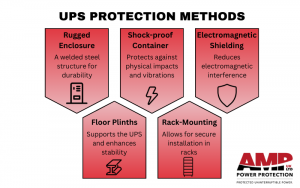
Why do we need Marine UPS Systems?
A Marine Uninterruptible Power Supply (UPS) is like a regular UPS, which has been customised to deal with the conditions which would be faced in marine conditions such as aboard a naval vessel or anywhere in close proximity to salt air, like an offshore oil rig.
Why are UPS needed on Ships?
Electrical equipment aboard a ship may face the problem being subjected to harsh environments due to the nature of being at sea. Aboard a ship all electrical equipment, including power supplies, have to deal with intense shock and vibration, a salty atmosphere and extreme temperatures, from hot engine rooms to cold rooms near the exterior of the ship.
Power supplies are especially important to protect as they are critical to the running of the ship. This is why Marine UPS are so necessary. The UPS will guarantee that power is supplied to the ship no matter the conditions, this can be from covering for small fluctuations to providing backup power during a shut down. If critical equipment loses power or is damaged there could be catastrophic consequences for everyone aboard the ship. The UPS then kicks in to supply power and keep operations running smoothly until the main power source is up and running again. It ensures a seamless transition to a backup power source, preventing data loss or downtime during power interruptions. Uninterruptible power supplies on ships must be designed to the highest quality standards for high ingress protection and tested to ensure they can withstand the needed conditions as they are critical to life such as DNV-GL.
Why are Marine UPS needed?
A marine UPS is needed because all equipment on the ship must continue to operate in the harsh conditions faced at sea. Regardless of whether the power supply is coming from it’s electric drive, generators or from shore power, the power must be protected by a UPS, and one that can handle such harsh shipboard conditions such as an Environmentally Protected UPS. An emergency power supply is required for the ship’s critical system such as:
- Emergency Bilge Pump
- Sprinkler System
- Steering Gear System
- Navigation Equipment
- Radio Communication
- Watertight Doors
- Ships Navigation Lights and Emergency Lights.
All of these systems are needed to operate the ship, communicate and navigate safely, highlighting the importance of a UPS.
How does a UPS operate in harsh environments?
A marine UPS must operate in harsh conditions, this is done by a process of ruggedising the UPS to withstand any environmental factors such as shock, vibration, or extreme temperatures. The ruggedisation of a UPS is dependant on various factors, and can be done as a modified off-the-shelf product (MOTS) or using a custom solution to best suit the environment.
There are many methods to add protection to a UPS such as:
- Welded steel rugged enclosure
- Floor plinths
- Shock-proof container
- Rack-mounting
- Electromagnetic shielding
These customisation options provide various benefits, creating a bespoke shockproof container will negate any vibrations and shock the UPS may experience on the unsteady waters onboard. Naval standards must be adhered to, and a custom solution is the most effective way to make sure these standards are met.

Our Range
AMP Power Protection Rugged marine certified UPS ranges are designed and tested to meet the harsh shipboard environment requirements such as extreme temperatures, shock and vibration and are normally fitted with AVM’s and protected to IP22 – IP54 (customer specified)
Our range of UPS have been used aboard Type 26 frigates and are a Marine Type Approved (MTA) range. This is DNV certified which includes type testing to meet the standards of the International Association of Classification Societies (IACS), covering the highest standards set by all twelve approval standards allowing for quick approval and supply to any vessel.
Contact us for more information on Marine UPS and how our custom solutions can help you.


